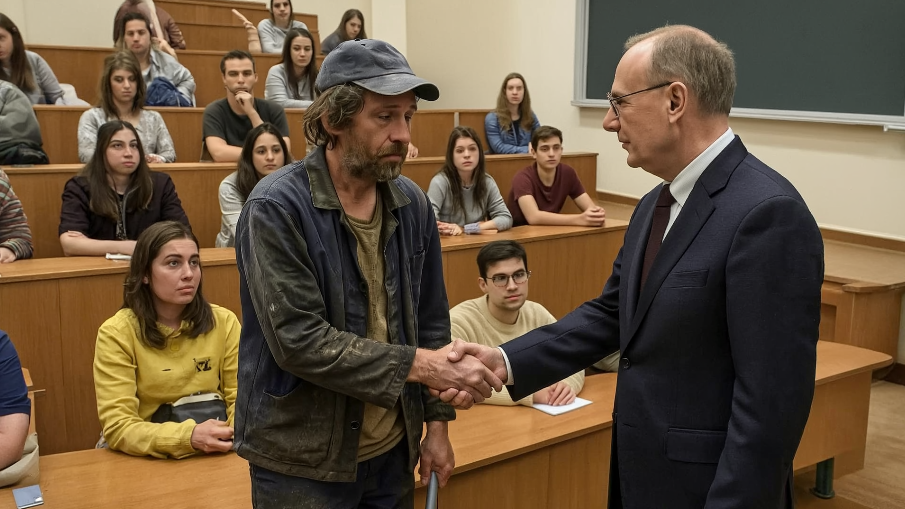He moved through the aisles like he was invisible.
Pushing a squeaky cart with a crooked wheel, the janitor mopped quietly as students trickled into the grand university auditorium. A few glanced his way, most did not. Some even stepped around the wet floor like it was a nuisance.
A pair of guys in the front row snickered as he passed.
“Man, he’s still here? You’d think after twenty years someone would give him a better mop,” one said, audible to the rows around him.
A girl scrolling on her phone laughed. “That guy probably knows every corner of this place better than the professors.”
“Yeah,” the other guy added. “All he has is a mop and a bucket.”
The janitor did not react. He kept moving.
He paused near the stage, gazing up at the empty podium where the guest speaker — a prominent entrepreneur, it seemed — was set to deliver a keynote on legacy, innovation, and impact. Rumor had it the dean himself had arranged for the speaker’s presence.
The seats filled. Anticipation grew.
Finally, the auditorium lights dimmed, and the dean stepped out.
“Ladies and gentlemen, thank you for joining us. Today we welcome a man whose story speaks for itself. A man who worked in silence while shaping the lives of thousands. A man who proves that greatness is not always loud — but is always present.”
Confused murmurs rippled through the crowd. Was this still the keynote introduction?
The dean continued. “We spend our lives chasing titles, applause, recognition. But this man — he built something larger than any of that.”
Then he turned toward the janitor, who had completed wiping a final corner and was quietly packing up.
And the dean said, his voice steady and full of pride:
“Please join me in welcoming the founder of the very scholarship program that put half this room through college…”
The crowd froze.
Heads turned. Mouths opened.
The janitor straightened his back. His eyes scanned the stunned auditorium.
As the room fell into shocked silence, the man reached into his pocket and pulled out a folded envelope.
Then he said, with a half-smile:
“Before we begin, there’s one more letter I need to read… and one person here who isn’t who they claim.”
One could have heard a pin drop.
The janitor — whose name no one seemed to remember — stepped up to the microphone. He adjusted it slowly, allowing people time to squirm in their seats. Some attempted to whisper, but no one knew what to utter.
“I know many of you do not know me,” he began. “And that is fine. I’ve spent twenty-three years traversing these halls with a mop and a flashlight. I’ve fixed every leaky pipe and replaced every burnt bulb. But this place… it is more than bricks and lights.”
He held up the letter. “This letter was sent to the foundation two weeks ago. It was anonymous at first — until we matched handwriting from past correspondence. The sender did not know I would be the one reading it today.”
A few eyes darted around the room. Whispers intensified.
“It accused a student here — a scholarship recipient — of deceiving the system. Falsifying their background. Pretending to be someone they were not.”
Gasps fluttered through the auditorium.
The janitor glanced down at the front row. The same individuals who laughed earlier now sat stiff, eyes wide. The girl who had laughed nervously pulled at her sleeve.
He turned a page. “The letter mentioned details only one person could have known. A student named Andrei Petran claimed to be the first in his family to attend university. Claimed his parents were factory workers from Iași. That is what the application stated.”
The janitor’s voice was steady. “But Andrei’s father owns a real estate agency in Bucharest. His mother teaches at a private school. They reside in a gated neighborhood.”
Andrei’s face turned pale. He stood suddenly. “This is ridiculous—”
“Sit down,” the dean said quietly, yet firmly.
Andrei sat.
